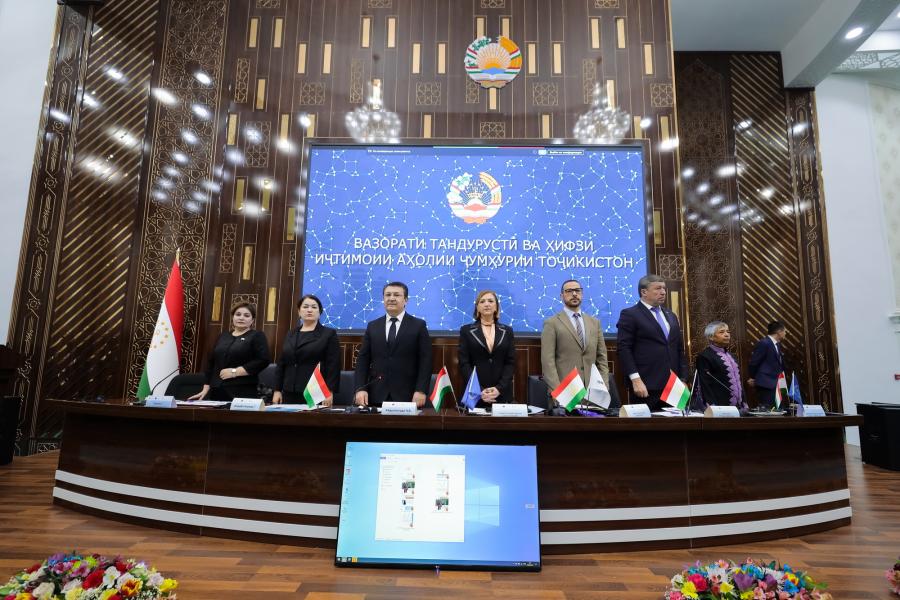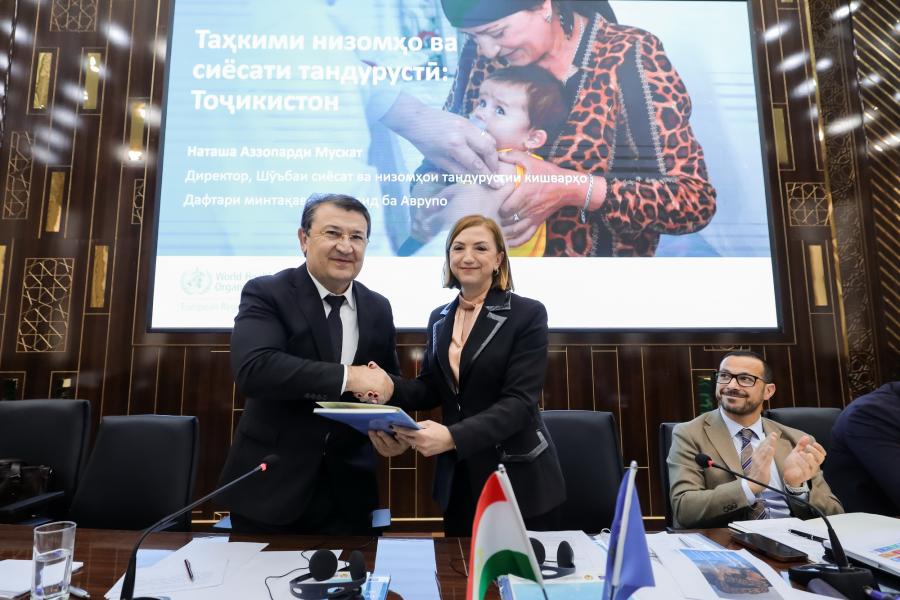Health systems marathon: to accelerate reforms in Tajikistan
25 February 2024
25 February 2024, Dushanbe – With support from the European Union and the World Health Organization Regional Office for Europe (WHO/Europe), a ‘marathon’ of high-level events was organized in February. Each event facilitated a deep dive into key components of the Tajik health system. The outcomes of the health systems marathon bring the country closer to ensuring quality health care is accessible and affordable for the entire population. The events were organized as part of the Health Development Programme, financed by the European Union.

Tajikistan is currently implementing ambitious health reforms to make progress towards universal health coverage (UHC): access to quality health care for all, without causing financial hardship. To this end, the country is working to improve the quality and affordability of health services and to ensure skilled health workers are available where they are needed most. With funding provided by the European Union, WHO/Europe provides significant, ongoing support to strengthen each component of the health system.
The marathon commenced on 20 February, with the Joint Annual Review, organized by the Ministry of Health and Social Protection of the Population. The Government of Tajikistan and development partners jointly assessed achievements and lessons learnt over the year 2023.
H.E. Raimundas Karoblis, the EU Ambassador to Tajikistan underlined: “We reiterate the principle that every human being has the right to enjoy the highest standard of health. There is an absolute need to boost the health system in the country and to make it work better and better. As European Union, we are committed, in Tajikistan, and across the globe, to allocate at least 20% of our 2021-2027 financial allocation to Human Development, including health for all.”

During the event, Dr Natasha Azzopardi-Muscat, Director of the Division of Country Health Policies and Systems of the WHO Regional Office for Europe, highlighted the need to build a more resilient health system. She handed over an important report on the health workforce to Minister of Health and Social Protection, Dr. Jamoliddin Abdullozoda. This first analysis of its kind in Tajikistan, which presents findings and recommendations which key to further strengthen and support health workers across the country.
“The Joint Annual Review demonstrated the great progress made on the implementation of the strategy on healthcare of the population up to 2030. With support from development partners, we will continue to strengthen our health system and to bring new innovations and technologies to our beautiful country.” Dr. Jamoliddin Abdullozoda, Minister of Health and Social Protection of the Population of the Republic of Tajikistan.
During high-level policy dialogues on 21 and 22 February, representatives from various government institutions and development organizations discussed the key findings of an analysis of the accessibility of medicines and exchanged views on how to overcome access barriers, such as high prices or stock-outs. They also discussed ways to protect people from high out-of-pocket payments for health care. New analyses carried out by WHO/Europe indicates that nearly one in five households in Tajikistan face catastrophic health spending due to out-of-pocket payments, which may make it difficult for them to meet their other basic needs, such as food, housing and heating. Tajikistan is currently rethinking health financing policy so that it can reduce the health system’s reliance on out-of-pocket payments and improve affordable access to comprehensive primary care services, including prescribed medicines and diagnostic tests, for the whole population.
“Tajikistan is implementing key reforms which will benefit the health and well-being of the whole population. WHO works closely with the Ministry of Health and Social Protection of the Population and many other partners to strengthen the entire health system. We are proud of our joint achievements in Tajikistan and committed to continue supporting the country to make good quality health care accessible and affordable to all,” Dr. Natasha Azzopardi-Muscat, Director of the Division of Country Health Policies and Systems.
Two more workshops were organized to agree on next steps to further strengthen primary health care, and the health workforce. The marathon of events culminated in a winter school on health systems, held on 22-24 February. WHO experts facilitated informative sessions on health systems, each session focusing on a different component. The participants represented a variety of ministries, government institutions and committees. Through group work and discussions, the participants of the winter school enhanced their understanding of what actions and policies need to be taken to advance towards UHC.
The health systems marathon was made possible as part of the Health Development Programme, funded by the European Union. The EU is a strong partner of Tajikistan and has invested over 60 million euros in the last decade to achieve UHC.
Links:
Can people afford to pay for health care? New evidence on financial protection in Tajikistan, available in English, Russian and Tajik:
UHC watch – tracking progress on affordable access to health care in Europe and central Asia: https:\apps.who.int\dhis2\uhcwatch\

